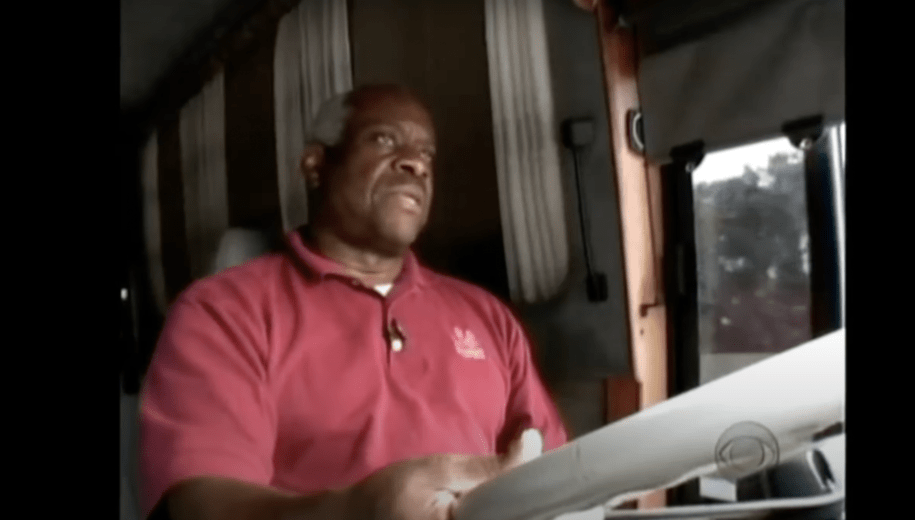Clarence Thomas, Anthony Welters, and the $267,230 R.V.
Clarence Thomas has a passion for the RV life. Despite the press coverage of his vacation junkets paid for by an endless series of “dear friends” this salt-of-the-earth, man of the people would have you believe that while jet-setting is OK, he would prefer to mix it up with regular folks. As he told 60 Minutes in 2007:
“I don’t have any problem with going to Europe, but I prefer the United States, and I prefer seeing the regular parts of the United States. There’s something normal to me about it. I come from regular stock, and I prefer being around that.”
Today the New York Times filled in some of the details of Thomas’s passion for the simple life:
“There he is behind the wheel during a rare 2007 interview with “60 Minutes,” talking about how the steel-clad converted bus allows him to escape the “meanness that you see in Washington.” He regularly slips into his speeches his love of driving it through the American heartland — “the part we fly over.” And in a documentary financed by conservative admirers, Justice Thomas, who was born into poverty in Georgia, waxes rhapsodic about the familiarity of spending time with the regular folks he meets along the way in R.V. parks and Walmart parking lots.”
Thomas bought his road yacht in 1999 for $267,230. It was eight years old and had only 93,618 miles on the clock — a good number for this type of vehicle. Today, a new 2024 model from the same manufacturer can cost up to $3 million.
There is no reason why Thomas should not indulge his passion for America’s highways and its supposedly ignored heartland along with its big box stores. But looming over this tale of wanderlust is a financial question. How did Thomas buy a vehicle that cost almost twice his then $136,700 salary?
RVs are not houses. Banks and other reputable lenders do not like to finance these highly customized vehicles — especially the high-end ones that are impossible to value. In addition, the Thomases were carrying a high debt load and had just taken out a new mortgage on their primary residence.
Thomas claimed that he had swung the deal by scrimping and saving. He lied. The purchase was underwritten, at least in part, by Anthony Welters, a close friend who made his fortune in the healthcare industry. It was just one more example of Thomas’ passion for accepting gifts and sponging off his friends while keeping his financial dealings off the books.
When asked by the Times about the financial arrangement, Welters admitted that he had a hand in the purchase. He also showed a title with a signed lien release indicating the loan had been ‘satisfied’ in 2008. But this raises more questions. ‘Satisfied’ does not necessarily mean ‘paid back’ — only that the lender releases the borrower from further obligation. Trump has a decades-long history of loans that lenders reduced or forgave without the grifter paying back the entire principal.
Welters did not give the newspaper any more information. So the citizen is left clueless about what financial benefit SCOTUS’ goodie bag champion may have received.
According to IRS rules, one person can lend another person money. However, the loan has to be well documented, showing the term, monthly payments, and interest rate. If the borrower does not honor the deal, then the lender must demonstrate an honest attempt to collect it — otherwise, the IRS reclassifies the loan as a gift. Which would also mean Thomas would have to add it to his federal financial disclosure. (For some reason, Judges do not have to report auto loans.)
There is a twist in the tale. Unlike most of Thomas’ fairy godfathers, Welters is a big-time Democratic donor who, along with his wife Beatrice, contributed between $200,000 and $500,000 to Obama’s 2008 presidential campaign and another $100,000 for his 2009 inauguration.
Perhaps Welters is a genuine friend who wanted to do a mate a favor without expecting judicial consideration. Or maybe Thomas provided him with some profitable contacts. I do not know. Welters will not reveal any details. And Thomas is not talking. So we can only speculate why the two are not forthcoming about what I assume both would claim is a perfectly innocent transaction.



